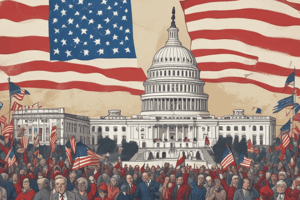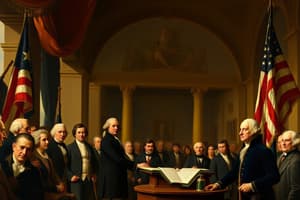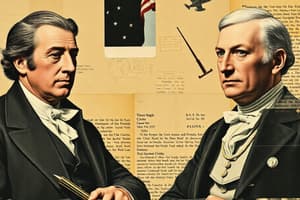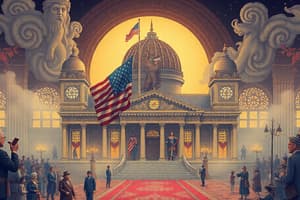Podcast
Questions and Answers
Which political party is associated with Alexander Hamilton?
Which political party is associated with Alexander Hamilton?
- Democrat Republicans
- Federalists (correct)
- Whigs
- Populists
What type of restrictions may exist for a legislative position?
What type of restrictions may exist for a legislative position?
- No term limits but with age restrictions
- Required residency in the state they represent (correct)
- Mandatory approval by the president
- Five-year citizenship requirement
Which political party is linked to Thomas Jefferson?
Which political party is linked to Thomas Jefferson?
- Libertarians
- Progressives
- Democrat Republicans (correct)
- Federalists
What is an important requirement for holding an executive position?
What is an important requirement for holding an executive position?
What is a typical characteristic of the judicial branch's requirements?
What is a typical characteristic of the judicial branch's requirements?
How long can members of the legislative branch generally serve?
How long can members of the legislative branch generally serve?
Which branch of government is responsible for defining laws?
Which branch of government is responsible for defining laws?
What is a typical function of the executive branch?
What is a typical function of the executive branch?
What is one of the primary functions of the legislative branch?
What is one of the primary functions of the legislative branch?
Which of the following powers does the executive branch NOT hold?
Which of the following powers does the executive branch NOT hold?
Which branch has the authority to confirm or reject presidential appointments?
Which branch has the authority to confirm or reject presidential appointments?
What can the legislative branch do to override a presidential veto?
What can the legislative branch do to override a presidential veto?
Which of the following is a power of the judicial branch?
Which of the following is a power of the judicial branch?
What is the primary role of the executive branch regarding laws?
What is the primary role of the executive branch regarding laws?
Which action can the legislative branch take regarding the judicial branch?
Which action can the legislative branch take regarding the judicial branch?
In terms of checks and balances, how can the legislative branch limit the power of the executive?
In terms of checks and balances, how can the legislative branch limit the power of the executive?
Flashcards are hidden until you start studying
Study Notes
Alexander Hamilton vs. Thomas Jefferson
- Hamilton led the Federalists, advocating for a strong central government and a robust national economy.
- Jefferson founded the Democrat-Republicans, promoting agrarian interests and states' rights.
Branches of Government
- The U.S. government is divided into three branches: Legislative, Executive, and Judicial.
Legislative Branch
- Selection: Members are elected by the public.
- Requirements and Term Limits: Senators serve six years, representatives serve two years, with no limits on re-elections.
- Function: Responsible for making laws, levying taxes, coining money, and declaring war.
- Powers Over Other Branches: Can impeach the president, create laws, override presidential vetoes, and approve or reject judicial appointments.
Executive Branch
- Selection: The President is elected by the Electoral College system.
- Requirements and Term Limits: Presidents must be natural-born citizens, at least 35 years old, and can serve two four-year terms.
- Function: Executes and enforces laws, manages national defense, and negotiates treaties.
- Powers Over Other Branches: Has authority to veto legislation and appoint federal officials and judges.
Judicial Branch
- Selection: Justices are appointed by the President and confirmed by the Senate.
- Requirements and Term Limits: No specific requirements; justices serve lifetime appointments unless they retire or are impeached.
- Function: Interprets the Constitution and laws, reviews case law, and resolves disputes.
- Powers Over Other Branches: Can declare laws unconstitutional and review executive actions for legality.
Studying That Suits You
Use AI to generate personalized quizzes and flashcards to suit your learning preferences.




